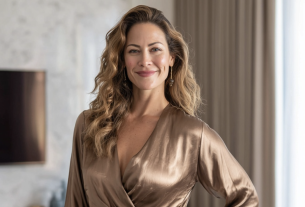I always thought betrayal was something loud, theatrical. Like in the movies: shattered dishes, shouting, a slamming door. In my life it arrived on tiptoe, in the silence of an empty house that smelled of apple pie and broken hopes.
That day, as usual, I was waiting for Viktor to come home for dinner. For thirty-five years I had waited for him for dinner. It was our ritual, unshakable as the Ten Commandments. Me—at the stove. Him—coming back from work, tired, but mine. Our small, cozy world built on trust and a shared future we had so carefully planned.
But the clock on the wall kept ticking. Loud, intrusive, counting off the seconds of my old life. Six o’clock. Seven. Eight. The pie in the oven had long since gone cold, and his car still hadn’t appeared at the gate. My heart, at first merely anxious, began to clench into a cold, prickly knot. He wasn’t answering his phone. He was rejecting the calls. That had never happened before. Not even in our worst fights, not even when we were young and foolish—he always picked up.
I walked through the house. Our house. Every object in it shouted about him, about us. His armchair with the worn armrest. The stack of newspapers on the coffee table. His house slippers by the door… Wait. The slippers were gone. And his mid-season jacket, too. And the duffel we’d bought for weekend trips to the dacha was no longer in its place in the closet.
Panic rose to my throat in a sticky, nauseating wave. I rushed to the bedroom. And there, on my pillow, lay a sheet torn from a notepad, neatly folded in half. Not an envelope, not a card. Just a ripped sheet.
I opened it with trembling hands. The handwriting was his—confident, sweeping, always seeming so reliable to me. Just a few words.
“Marina, I’m sorry. I’ve fallen in love with someone else. I’m starting a new life. Don’t look for me.”
And that was all. No explanations. No “thank you for everything.” Thirty-five years of life, two children raised, grandchildren, shared dreams of growing old by the sea—all of it crossed out by a dry, soulless sentence.
I sank to the floor right there by the bed. I couldn’t breathe. The walls of the room began to blur, to close in, to press down on me. Sorry… In love… New life… Words like hammers, smashing my world to dust. Tears? No, there were no tears. There was only a deafening, icy shock. As if I’d been punched in the gut, knocking all the air and all the soul out of me.
How long I sat like that, I don’t know. An hour, maybe three. I came to with a thought that pierced my mind like an electric jolt. Money. Our savings. Everything we’d put aside for that old age by the sea. Every last kopeck.
I ran to the old computer in the study. My hands wouldn’t obey, my fingers slid off the keys. The password… The online banking password. Our firstborn’s birthday. How ironic. A few agonizing seconds of loading, and the page opened.
Zeros glowed on the screen.
A big, bold, taunting zero.
The account that only yesterday held enough to keep us comfortable for a decade was empty. Drained. Picked clean to the last ruble.
That’s when it hit me. I screamed. A low, terrible sound, like a wounded animal. I clutched the edge of the desk so I wouldn’t fall. He hadn’t just left. He had robbed me. He took not only my past and my present, but my future too. He left me at fifty-eight with nothing. No love, no money, no faith in anything.
In that moment I felt like the unhappiest, most humiliated woman in the world. A victim. A naive fool who believed in family values right up until her husband packed his bags and wired the money to his new sweetheart. He’s probably laughing at me now, I thought. Sitting somewhere warm with his young doll, drinking expensive wine and celebrating the start of a “new life.” And me… what about me?
I cried all night. I pitied myself, cursed him, replayed all thirty-five years, trying to understand when everything went wrong. When did his gaze turn cold? When did he stop sharing his thoughts with me? When did those long pauses and vague “work matters” creep into his conversations?
And by morning, when the tears had dried and only a scorched desert remained in my soul, anger came. Cold, clear, purifying anger. And with it—a memory. A memory from a year before, which at that moment felt like a lifeline.
My surprise.
A year ago Viktor had been especially charming. He flitted around the house, looked into my eyes, brought me flowers for no reason. Starved for attention, I melted. And then he started a conversation. From afar, cautiously.
“Marinochka,” he said, putting his arm around my shoulders, “we’re not young anymore. The kids are grown, they’re on their feet. It’s time to think about ourselves. About our golden autumn.”
Of course I agreed. Who doesn’t want a golden autumn?
“Keeping money under the mattress is the past,” he went on, pulling some charts and diagrams from a folder. “Inflation eats it up. And I’ve found a fantastic investment project. As reliable as a Swiss bank! If we invest now, we’ll double our capital in a couple of years. We’ll buy that little house by the sea we’ve dreamed about.”
My heart skipped a beat. The house by the sea was my most cherished dream. Viktor knew that. He always knew how to hit the most vulnerable spot.
But there was one “but.” Our current savings weren’t enough for the “project.” And Viktor, as if in passing, offered a solution.
“Remember your parents’ apartment?” he asked gently. “It’s sitting empty anyway, and we’re just paying utilities. Let’s sell it and put the money to work. It’s our shared future, Marisha!”
Something clicked inside me then. A small, barely audible bell of alarm. My parents’ apartment. The only thing I had left from them. My quiet harbor, my memory, my inheritance. I had never thought of it as an asset. It was… sacred.
I saw the way his eyes shone. They shone too brightly. He looked like a gambler who had put everything on one card. He hurried me, persuaded me, pressed me.
“Marinochka, you don’t understand any of this,” he would say condescendingly when I tried to ask questions. “Trust me. I’m your husband. I wouldn’t steer you wrong.”
It was that phrase—“you don’t understand”—that became the last straw. I’d heard it in various forms for decades. All my life I had been “behind my husband.” I ran the house, raised the children, created comfort. And he handled the “serious matters.” I believed that’s how it should be. But in that moment I looked at him for the first time not as a wife, but as… a partner in a deal. And I didn’t like what I saw.
The next day, saying I was meeting a friend, I went to my nephew. Pashka, my late sister’s son, was a sharp lawyer. I loved him like my own. I laid everything out to him, like in confession, feeling like a terrible traitor.
Pasha listened silently, frowning. He didn’t interrupt, just nodded. When I finished, he stared out the window for a long time, then said:
“Aunt Marina, intuition is a powerful thing. Especially a woman’s. Let’s do this… Don’t refuse him outright. There’ll be a scandal, and he’ll still find a way to steamroll you. We’ll do it smarter.”
And he told me about a trust fund. I understood little of the legal terms, but I grasped the gist.
“It’s like a safe with two keys,” Pasha explained patiently. “We’ll draw up the deal so that the money from the sale goes into this fund. And you can only access it or do anything with it if you both give written, notarized consent. Or by court decision in a divorce. One person—whether you or him—won’t be able to do a thing.”
“And he… he won’t notice?” I whispered.
Pasha smirked.
“From what you’ve said, he’s so high on his brilliant idea right now that he’s reading documents diagonally. We’ll tuck the clause into the middle of the contract and mask it with complex wording. I’ll prepare the papers so clean a gnat couldn’t slip through. Your job is just to insist everything be ‘official, through lawyers, for safety.’ Say you’re scared and want peace of mind. Play the role of the naive wife fussing over her family nest.”
That evening I felt like a spy in my own home. My heart pounded as, with the most innocent expression, I suggested to Viktor that we do everything through “a good lawyer—little Pasha, he’s family, he won’t cheat us.”
Viktor grimaced. He didn’t like anyone interfering in his “schemes.” But my frightened look and babbling about “guarantees” apparently convinced him. “Fine,” he waved it off, “if it’ll calm your simple soul… Have it your Pasha’s way. I’ll be making all the real decisions anyway.”
The deal went through a week later. I sat in the notary’s office, signing papers, my hands growing cold. Viktor stood beside me, drumming his fingers impatiently on the table. He skimmed the contract Pasha slid to him and, without reading closely, scrawled his big, confident signature under the clause about the trust. He didn’t even realize he’d just locked the door to his own mousetrap. And handed me the key.
Back then I didn’t know why I was doing it. It was instinct, an attempt to protect the last little island of my own territory. I couldn’t have imagined that contract would become my salvation.
And now, sitting in the cold kitchen of an empty house with a zeroed-out account, I suddenly understood: the game wasn’t over. Yes, he took our current savings. A decent sum, but not catastrophic. Enough for a few months of luxury with a young mistress at some resort. But the main capital—the money from the sale of MY apartment—was in an impregnable fortress. And the key to that fortress was mine.
I stood up and went to the mirror. A woman looked back at me who had aged a decade overnight, exhausted, with red eyes. But there was something new in her gaze. Steel.
The first thing I did was call Pasha.
“Pashenka, hi. It’s me,” I said—my voice hoarse but steady. “He’s gone. And he cleaned out the account.”
There was a second of silence on the line.
“Aunt Marina… I’m so sorry. How are you?”
“I’m fine,” I lied. “Pasha, tell me the main thing. The fund. Is it safe?”
“Absolutely,” he answered without hesitation. “I checked everything this morning as soon as you called. The money’s there. And without your signature he won’t get a single kopeck. Not. One. Kopeck. You can relax.”
I exhaled. The stone that had weighed on my chest all night shifted a little.
“What do I do now?” I asked.
“Nothing. Live. And wait. Sooner or later he’ll run out of money. And then he’ll come to you. Well, he’ll call. And that, Aunt Marina, is when it gets interesting. The main thing—hold firm. No pity. Remember everything.”
The next weeks felt like a strange dream. I went through the motions: went shopping, cooked for one, answered worried calls from the kids—yes, I’d had to tell them everything. My son was furious, ready to “find him and talk man to man.” My daughter cried and wailed, “Mama, how could he?” I asked them not to interfere. This was my war. And I had to win it myself.
I threw out all his things. Every last one. I stuffed them into big black bags and set them by the trash bins. I dragged his armchair onto the balcony. I smashed the mug he’d drunk coffee from for thirty-five years. And with each item tossed, with each shard, I could breathe a little easier. I was cleansing not just the house—I was cleansing my life of his presence.
Sometimes despair would wash over me. I’d wander through the empty rooms and howl from loneliness and hurt. But then I’d look in the mirror, remember the chilly lines of his note and the zero in the bank account, and the anger would return, giving me strength.
I started doing what I’d always dreamed of but never had time for—or his approval. I signed up for a landscape design course. I bought myself an easel and paints. I blasted the music he used to call “dreary droning.” I was learning to live for myself. And you know, I started to get the hang of it.
Almost three months passed. I had almost gotten used to the new life, to the quiet and the freedom. And one evening the phone rang. An unfamiliar number. I looked at the screen and my heart pounded. It was him. I knew.
I took a deep breath, counted to ten, and tapped the green button.
“I’m listening,” I said in an even, calm voice that surprised even me.
“Marina? It’s me, Viktor,” his voice sounded in the receiver—slightly flustered, but still with that note of smugness.
I said nothing.
“Marina, do you hear me? There’s been some kind of misunderstanding with our money. With the investments. I can’t get access to them.”
I smiled to myself. “Misunderstanding.” What a beautiful word.
“What money of ours, Vitya?” I asked in an icy tone. “Your money, as I understand it, has run out.”
Silence on the line. He hadn’t expected that. He probably thought I’d burst into tears and beg him to come back.
“What do you mean ‘mine’?” he finally said, irritation creeping into his voice. “That’s our joint capital! The money from selling the apartment!”
“No, Vitya. That’s the money from selling my apartment. My parents’ apartment. And what was ‘ours’—you took three months ago. I hope you had a nice vacation.”
“Marina, don’t be ridiculous!” he began to lose his temper, slipping into a shout. “I need the money urgently! I have… we have plans! You must go to the notary immediately and sign the papers!”
I went to the window. Soft snow was falling outside. The city was sinking into evening dusk, lights coming on. And for the first time in a long while I felt absolute, ringing calm.
“I don’t owe you anything, Viktor,” I said quietly but distinctly. “You started a new life, remember? You wrote it yourself. So start it. From scratch. The way I’m about to.”
“What… what are you doing?!” he hissed into the phone. “You want to leave me penniless?! After everything I’ve done for you?!”
“And what did you do for me, Vitya? Let me live with you? Bear your children? Cook your soups? And then you threw me out like an old thing and stripped me to the bone? Is that what you call ‘done’?”
He fell silent, breathing heavily. Apparently he’d run out of arguments. Then he turned to the last resort—a pathetic parody of remorse.
“Marinochka… forgive me. I was wrong. I’m a foolish old man, the devil led me astray. That… woman tricked me. I don’t need anyone but you. I understand everything now, I want to come back. Let’s start over? Just sign the papers, and I’ll be home tomorrow.”
If he’d said that three months ago, my heart would have wavered. But not now. I listened to his pitiful babbling and felt not gloating, not vengeful triumph, but only… disgust. And a vast, boundless relief.
I had won. I hadn’t defeated him. I had defeated my former life, my dependence, my naivety.
“Good-bye, Viktor,” I said, and before he could answer, I hit the red button.
I blocked the number. And another. And another.
In that moment, I realized I was free. Truly free.
I filed for divorce the next day. The proceedings were simple and fast. Thanks to Pasha’s foresight and the impeccably drafted agreement, the trust fund was recognized as my personal property, received from the sale of an inheritance. Viktor got nothing. He sat on the bench across from me—gaunt, aged, with a dimmed gaze. He tried to say something about “jointly acquired assets,” but the judge shut him down quickly.
They say his young sweetheart vanished the moment she realized the golden stream had dried up. He was left alone, without money, without family, without a future. I didn’t feel sorry for him. I felt nothing. Emptiness.
And my life… my life was just beginning. At fifty-eight.
I didn’t buy a cottage by the sea. That dream died with my old life. Instead, I did a beautiful renovation of my apartment. I threw out the old furniture that remembered our quarrels and his lies. I bought a comfortable sofa, a big table for my drawings, and a thousand little things that delighted me—and only me.
I finished the landscape design course with honors. My thesis project—“The Garden of a New Life”—won first place in the city competition. And now I have my first commissions. Small, but mine. My own money, earned with my talent and my work.
Sometimes in the evenings I sit in my bright, renewed living room, sip herbal tea, and look over my sketches. Outside, the city hums, alive with its own rhythms. And I am part of that life. Not someone’s wife, not someone’s support, not a “simple soul who understands nothing.”
Just Marina. A woman who found the strength to survive betrayal and build her world anew. And you know, I like this world much more. It’s honest. And it’s all mine.



